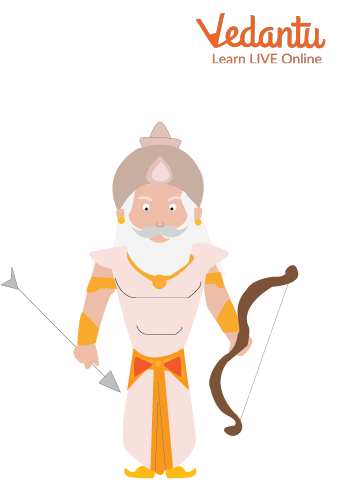Bhishma: One of the Greatest Characters of Mahabharata

The story of Bhishma is about King Shatanu’s Eldest son, Devavrata, who became known as Bhishma because of his capability to keep strict promises. The key takeaway from this story are:
Sometimes selflessness is good.
Keeping promises is one of the best characteristics of a human being.
The Story of Bhishma: The Legend of Mahabharata
Here, we have presented to you the Bhishma story, a part of the greatest epic Mahabharata. This mythological story presents the story of the great Bhishma, who became famous for his strength of character. When king Shantanu fell in love with Satyawati, a fisherman’s beautiful daughter, his father agreed to give her a hand, but only if her son would become the next king. But Shantanu could not agree with the condition and left. However, Devavrata (Bhishma) could not see his father unhappy and hence made the biggest sacrifice that earned him the name Bhisma. What was it? Read ahead to know more about Bhishma.
Summary of the Story Bhishma
Thousands of years ago, there was a king called Shantanu. He was the king of Hastinapur. He went to various jungles for hunting. Suddenly, he started to smell a sweet fragrance nearby. When he followed the smell, he saw it was coming from a beautiful woman.
He asked the woman her name. She said that her name was Stayawati. It did not take much time for King Shantanu to fall in love with Satyawati.
One day, king Shantanu went to Satyawati's father to ask him for his permission to marry his daughter. The fisherman immediately agreed to the match, but he also placed one condition in front of him. Satyawati’s father said, “I will give my daughter’s hand to you, but you have to promise that only Satyawati’s son will become the next king of Hastinapur.”
Shantanu could not promise this to Satyawati's father because he already had a son, Devevrata. So he was very sad. He went back to his palace without taking Satyawati with him. But Devavrata saw his father’s sadness. When he asked his father what the matter was, king Shantanu told him everything.
Hearing everything, Devavrata went to Satyawati’s house to meet her father, and he promised that he would never become the king after his father. Instead, he will serve Hastinapur selflessly. But Satyawati’s father was very clever. So he asked Devavrata, “You may not become the king, but what happens if your son becomes the king?”
Devavrata wanted to see his father happy. So, to satisfy Satyawati’s father, he promised never to marry and have children.
After that, he took Satyawati to the palace and helped his father, King Shantanu, marry Satyawati.
Since then, Devavrata became famous for keeping his strict promises like Bhishma, called Bhishma Pratigya. He never married or became the king of Hastinapur. Devavrata’s ability to keep strict promises made him famous as Bhishma.

Bhishma, the Legend of the Mahabharata
Moral of the Story Bhishma
The story Bhishma, The Legend of Mahabharata is one of the most significant parts of the Mahabharata. The most important question of the story “who cursed Bhishma?” is also one of the most tricky yet important parts of the Mahabharata as well. As great as Bhishma is, children can learn a lot from both the story and Bhishma. They understand the necessity of being true to their words. The story can also teach kids how essential family is in our life.
Even though Amba, who was in love with Bhishma cursed him, he refused to marry her to keep his promise. This shows the rigidity of his character, also another essential thing to learn from Bhishma, the legend.
Note to the Parents
If one reads the above-mentioned story, it is easy to understand why did Bhishma not marry. It shows his strength of character. Parents should read this story to kids to teach them to be truthful to their promises. This excerpt story from the Mahabharata is one of the best in teaching kids the importance of family and its love in everyone’s life.


FAQs on Bhishma: One of the Greatest Characters of Mahabharata
1. Why did Amba curse Bhishma?
Amba was the one who cursed Bhishma because when Bhishma kidnapped Amba so she could get married to Vichitravirya, she declared that she was in love with someone else. But when Amba could not get married to the person she loved, she requested Bhishma to marry her. But Bhishma refused by saying that he would never marry anyone. In response, Amba cursed Bhishma that she would kill him at her next birth.
2. Why did Bhishma never marry?
You must have often heard the question why did Bhishma not marry? From the abovementioned story, we know that Bhishma promised Satyawati’s father that he would never become the king of Hastinapur and serve selflessly so Satyawati’s son could become the king. But when Styawati’s father expressed his suspicion about his son wanting to become a king, he also promised he would never marry anyone and have children. That is why Bhishma never got married.
3. Who loved Bhishma?
You can learn from the summary of the story that it was Amba who was in love with Bhishma. But when she asked Bhishma to marry her, he refused, saying he would never marry anyone.
4. Do you think Satyawati’s father was a clever man or a wise man?
Satyawati’s father placed a condition so Satyawati’s son could become the king of Hastinapur that made Bhishma promise lifelong celibacy. So, yes, Satyawati’s father was a clever man indeed.
The story of Bhishma is about King Shatanu’s Eldest son, Devavrata, who became known as Bhishma because of his capability to keep strict promises. The key takeaway from this story are:
Sometimes selflessness is good.
Keeping promises is one of the best characteristics of a human being.




